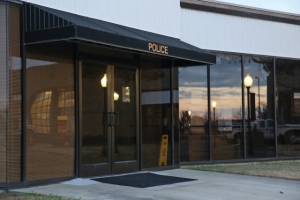GPD officers worried about safety, leadership
By John Joyce
Published in News on January 17, 2015 10:32 PM
Some Goldsboro police officers are worried.
They don't just read about the increasing number of reports of violence in their community. They are there on the front lines.
They say they are concerned about their community -- and about their own safety, and that is why they decided to speak out.
They asked to remain anonymous so they could comment without fear of reprisal.
And each began with the assurance that they love their jobs and care about their community.
*
The top button on the uniform collar slips through the last eyelet. The Glock 9mm slips into its holster, the snap fastens.
The ritual is the same before each shift -- day, night, or special assignment -- for every officer who puts on the uniform.
"When I'm putting mine on, it is the transition into game mode and getting your mind right for work," one officer said. "That is when I have to start to try to leave home and personal stuff at home."
These are the men and women who gear up every day and answer the call without knowing for sure whether or not they will make it home to their families.
Increasingly, however, an already inherently dangerous job is becoming more and more difficult due to a local gang war being waged on city streets, a national controversy depicting police officers as targeting young black males and officers themselves being targeted in retaliation.
The officers are concerned that not enough people are listening and not enough is being done.
"Our brass either doesn't think there is a problem in the city or is ignoring it, because it is bad on the streets right now," one officer said.
Last year, Goldsboro saw a rise in violent crime, with more than 80 people shot and more than 100 shootings into occupied vehicles and dwellings.
And the officers say they would like to solve more of those crimes, but they cannot get cooperation from the community.
Witnesses, they said, are simply afraid to speak up -- and those who do often come forward in secret to protect themselves and their families.
Officers say they often hear that testifying is simply too dangerous.
"Man, I never would have imagined the amount of people who shoot each other now, and would rather retaliate than just say who shot them," another officer said.
The officers said there are groups on the south side of the city who identify themselves as Bloods, a nationally recognized gang with "sets" or local branches popping up more and more on the East Coast.
On the north end, there are Crips, the rival gang of the Bloods, and other gangs who have aligned themselves with the Crips.
"The North End Boys, the Crips, they tend to be more structured, more loyal to one another," an officer said. "The Bloods, these guys over here on the south side, they don't care who you are, if you're a Crip or if you're a Blood or not. They'll shoot each other down, rob each other, whatever."
And, if a north side car shows up on the south side, pretty soon shooting will erupt, and vice versa.
Citizens are understandably scared -- and the reluctance to assist investigations as well as other factors, make it hard for the officers to protect their city, they say.
And that is what they want to do, the officers said. And they are doing it fairly and respectfully, they added.
"We just want the community to know, more than anything else, that the officers -- we are out there doing our jobs," one of the officers said. "We are trying. We are working. And I don't (care) about black or white or who has got money and who doesn't. It's not about that for the officers. It's about who is doing the shooting and how do we get it to stop."
Another obstacle to getting the bad guys off the street is keeping track of who they are.
One of the officers said that at one point there was a photo display in a back office inside the police department that identified key players in the local gangs, which allowed officers to be on the lookout for suspects when answering routine calls and making traffic stops.
"That went away for some reason. It was working, we knew who was who and who had charges on them and all. But that is gone now," the officer said.
And that lack of information could greatly affect an officers' safety, especially if he comes across a dangerous suspect, he added.
"Before too long an officer is going to get hurt, seriously hurt, and then what," he said.
The officers who spoke said they are not concerned about promotions, salaries or benefits. They want respect and a little more appreciation for the job they do and the risks they take.
"It doesn't cost the city anything for a supervisor to tell his troops, 'Good job last night guys, way to come back safe,' but that doesn't happen," an officer said. "And it is not about the money. I could be making $10,000 more somewhere else. I stay because this is my city, my home. And I want to make a difference -- here."

